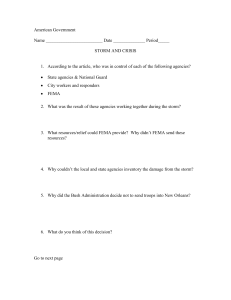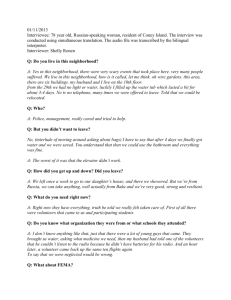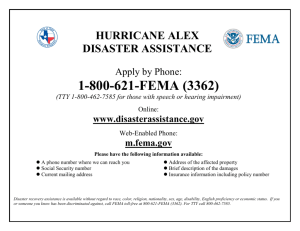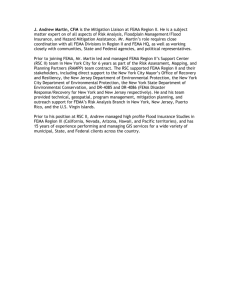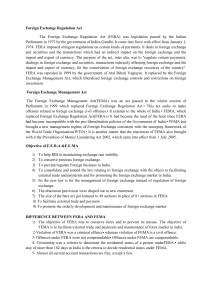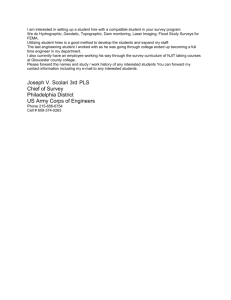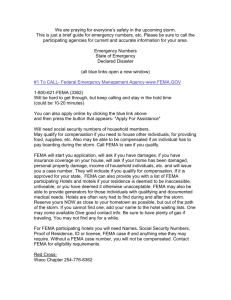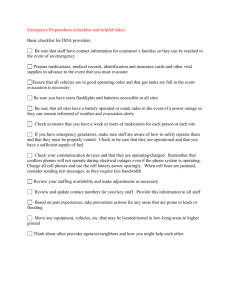Letter - NRI - Rashmin Sanghvi & Associates
advertisement
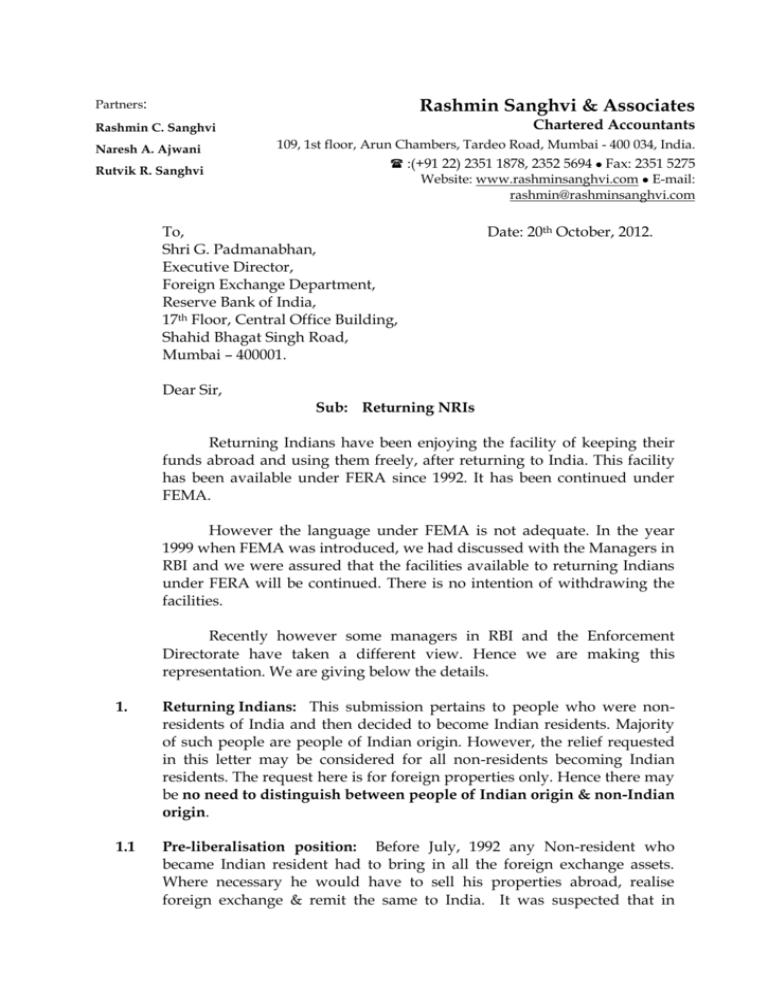
Rashmin Sanghvi & Associates Partners: Chartered Accountants Rashmin C. Sanghvi Naresh A. Ajwani Rutvik R. Sanghvi 109, 1st floor, Arun Chambers, Tardeo Road, Mumbai - 400 034, India. :(+91 22) 2351 1878, 2352 5694 Fax: 2351 5275 Website: www.rashminsanghvi.com E-mail: rashmin@rashminsanghvi.com To, Shri G. Padmanabhan, Executive Director, Foreign Exchange Department, Reserve Bank of India, 17th Floor, Central Office Building, Shahid Bhagat Singh Road, Mumbai – 400001. Date: 20th October, 2012. Dear Sir, Sub: Returning NRIs Returning Indians have been enjoying the facility of keeping their funds abroad and using them freely, after returning to India. This facility has been available under FERA since 1992. It has been continued under FEMA. However the language under FEMA is not adequate. In the year 1999 when FEMA was introduced, we had discussed with the Managers in RBI and we were assured that the facilities available to returning Indians under FERA will be continued. There is no intention of withdrawing the facilities. Recently however some managers in RBI and the Enforcement Directorate have taken a different view. Hence we are making this representation. We are giving below the details. 1. Returning Indians: This submission pertains to people who were nonresidents of India and then decided to become Indian residents. Majority of such people are people of Indian origin. However, the relief requested in this letter may be considered for all non-residents becoming Indian residents. The request here is for foreign properties only. Hence there may be no need to distinguish between people of Indian origin & non-Indian origin. 1.1 Pre-liberalisation position: Before July, 1992 any Non-resident who became Indian resident had to bring in all the foreign exchange assets. Where necessary he would have to sell his properties abroad, realise foreign exchange & remit the same to India. It was suspected that in Page No. 2 reality, many of these returning NRIs kept their assets abroad in discretionary trusts. 1.2 Liberalisation in 1992: In July, 1992 Government of India issued six notifications granting exemptions from several different provisions of FERA to the returning Indians. These notifications were covered with a press note and a circular issued by RBI in Sept. 1992 – ADMA Circular No. 51 dated 22nd Sept., 1992. It explained the notifications. A summary of all the provisions is: On return to India, the returning Indian could retain all his assets abroad. There was no need to make any declaration under FERA. He could change his assets, in the sense that he could sell one asset and buy another. He could retain dividend/ interest/ rent earned on the assets. He could reinvest these incomes or spend the same. He was at liberty to bring the assets to India or to retain them abroad. He could gift these assets to anyone. On death, his foreign assets would pass to his heirs without any restrictions. The only restriction in our interpretation was that on return to India the NRI could not continue any sole proprietary or partnership business or professional activities outside India. However, if the returning Indian held shares in any company, the shares would be considered as his investments. The company could continue business abroad. 1.3 FEMA: When FEMA replaced FERA, one of the purposes was to make a précis of FERA. All the six notifications and the circular have been summarised into one sentence under section 6(4). The section is reproduced below for immediate reference. Section 6(4) – “A person resident in India may hold, own, transfer or invest in foreign currency, foreign security or any immovable property situated outside India if such currency, security or property was acquired, held or owned by such person WHEN he was resident outside India or inherited from a person who was resident outside India.” This section grants the permission to continue to hold foreign assets abroad provided that the asset was held by him when he was a nonresident. In absence of section 6(4); holding of foreign assets abroad would amount to violation of sections 4, 6 & 8 of FEMA. 2. Let us consider a few illustrations: 2.1 New Assets: Mr. X, a non-resident of India held shares in Microsoft U.S.A. He returned to India and became Indian resident. After the return, he got bonus and rights shares. He sold 100 shares of Microsoft and purchased Google shares. All these new shares were not held by him WHEN he was Page No. 3 a non-resident. Hence if he continues to hold the shares abroad, under a strict interpretation of S.6 (4) it amounts to a violation of FEMA. 2.2 Renewal of old Assets: Mr. Y had a bank fixed deposit of U.S. $ 10,000 abroad. He also had an investment in mutual funds. He came to India and became Indian resident. Thereafter, on maturity of the deposit and the mutual fund scheme he renewed both the investments with interest. The new deposit as well as the mutual fund units were not held by him prior to the date of his return to India. Hence they were not held by him WHEN he was a non-resident. As per section 6(4), his continuation of these investments amount to violation of FEMA. Yet all these moneys were permitted to be retained abroad under the notifications issued in July, 1992. 2.3 Repatriation: In all the above cases, the returning NRI has to sell the new shares or mutual fund units. The sale proceeds together with the dividend & interest earned have to be remitted to India. Section 8 of FEMA. Present Section 6(4) does not grant exemption from FEMA provisions to the income earned after return to India. 2.4 Bank account: Returning NRI can continue to hold on to his bank account abroad and operate the same. His incomes on foreign investment can be deposited in his account. However section 6(4) states that “A person resident in India may hold, own, transfer or invest in foreign currency, foreign security or any immovable property situated outside India …”. Legally, bank account is neither a “foreign currency”, nor a “foreign security” nor an “immovable property”. Bank account can be considered as “Foreign exchange”. However under section 6(4) of FEMA, “foreign exchange” has not been included. Thus legally he cannot even hold a bank account. Nor can he open new bank accounts. 2.5 Incomes: On investments held abroad, a person will earn income. Under section 8 of FEMA he is required to bring back his income within the specified time. He cannot retain it outside India under section 6(4). 3. GOI/RBI Policy: Clearly, this was not the intention while drafting FEMA. In fact, a clarification was issued after passing FEMA. Several people had represented that under FERA there were detailed circulars and a full Exchange Control Manual. These provided adequate answers to many of the queries of citizens of India and foreign investors. Under FEMA, the précis did not give all the clarifications required. Hence a clarification was made by RBI that wherever the new provisions did not adequately clarify any provision, the old provisions under FERA would apply. ADMA circular No. 11 dated 16th May, 2000; paragraph 3. Page No. 4 It was a declared policy of the Government of India and RBI that there is a continuous liberalisation. There was no question of going back to increasing restrictions. However, section 6(4) amounts to withdrawing the liberalisations granted in the year 1992. Clearly this is contrary to the intentions and the declared policy. 4. In the circumstances, in our humble submission, we need to go back to the old position of 1992 – at the least. In fact, probably some more liberalisation may be given. 5. The right course of action is to amend section 6(4). However, this has to be done by the Parliament. RBI or even GOI cannot amend the law. In the circumstances, the following approach may be taken: A representation may be made to the Government to amend the FEMA. Until the law is amended, RBI may give liberalisation through notifications/circulars. A notification may be issued restoring the position as on July, 1992. Under FEMA we may not need all the six notifications. One notification clarifying the object of section 6(4) may be adequate. 6. Why the need for this representation has arisen 20 years after the liberalisation! Let us consider the case of Mr. A. This happened very recently. Mr. A was a non-resident of India. When he returned to India, he had substantial wealth abroad. He retained the wealth abroad. Out of this wealth he invested in the unlisted equity shares of a foreign company. For some reasons, Enforcement Directorate (ED) made enquiries. The ED officer had doubts about FEMA provisions. Hence he met an RBI manager and enquired. The RBI manager advised that an Indian resident cannot invest in unlisted shares of a foreign company. Empowered with this advice from RBI manager, ED officer served a notice on the resident. All the transactions of receipts as well as payments entered into by the foreign company have been totalled up and alleged as a violation of FEMA. In another case, a Chartered Accountant met the RBI manager to discuss whether a returning NRI could open a bank account abroad with his funds held outside India. The funds were acquired when he was a nonresident. He was asked: “Why does a person need a foreign account? He cannot open such an account.” We do not wish to blame any individual. The current managers may not be knowing about the background of FERA and the circular of 1992. The issue is of having clear law. Page No. 5 7. Taking a view that what was permitted to returning NRIs for all these years, is now not permitted, will clearly go against the facilities which the Government had promised. 8. Representation: We request that appropriate circulars may be issued whereby returning NRIs can enjoy the facilities as permitted under the circular 51 of 1992 under FERA. We request for an appointment so that we can explain the matter personally. Thanking you, Yours faithfully, For Rashmin Sanghvi and Associates Partner Rashmin Sanghvi. C.C.: Chief General Manager, in-charge, Chief General Manager - Compounding Cell. Reserve Bank of India, Mumbai.
